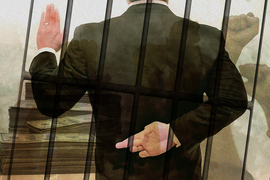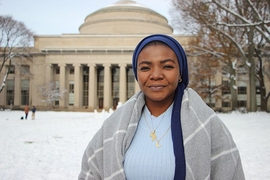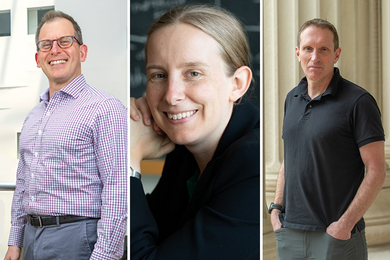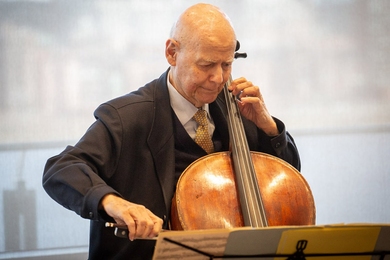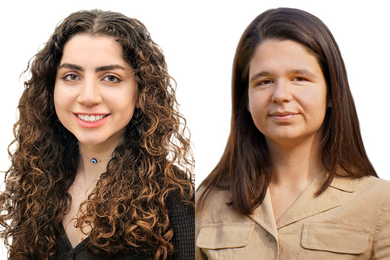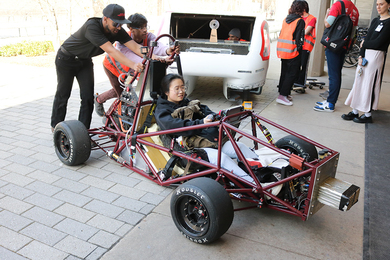To Ada Petriczko, being born a woman can be a matter of life or death. Hailing from Poland, she reports on sexual violence and gender injustices around the globe. As a human rights journalist, her mission is to amplify the voices of women who have been systematically silenced by their communities and governments. Their stories have to be heard, she argues, in order to reshape our societies. This includes reporting on her home country, where democratic stability and women’s rights are increasingly under threat.
Petriczko joined the MIT Center for International Studies (CIS) last fall as its Elizabeth Neuffer Fellow. The fellowship is awarded annually by The International Women’s Media Foundation and provides its recipient with research opportunities at MIT and further training at The Boston Globe and The New York Times.
Recently, she sat down to discuss her guiding principles as a journalist, the challenges facing her craft, and the rewarding experiences of this fellowship. She also weighs in on the rise of autocracy in Central and Eastern Europe. On Feb. 3, she will explore this topic and its impact on free media at a CIS Starr Forum event with experts from Poland, Hungary, and Russia.
Q: One of your fields of interest is ethics in journalism. What does it mean to be an ethical journalist to you? And what are some of the challenges that ethical journalism faces today?
A: I don’t believe in objectivity, but I do believe in fairness. Ethical journalism is about being fair to the facts and being fair to the people you’re writing about. Aidan White, an esteemed journalist who founded the Ethical Journalism Network, told me in an interview that there are about 400 different journalism codes of conduct in the world, but if you examine them closely, they all boil down to the same five core principles: accuracy, independence, impartiality, humanity, and accountability. I try to play by these rules.
I report on sexual violence and other human rights violations within vulnerable communities and have been in situations in which people don’t want to share their experiences. I always respect their requests and back out, even if I’ve traveled far for the story. This can be a deal breaker in our current news landscape, which is extremely fast-paced and demanding. Ethical journalism takes more time and more thought. But I’ve found ways to talk about taboos without violating them. And that is oftentimes even more powerful.
We are facing a transitional moment in the information ecosystem. The rise of social media, and the obsolete financial models for media outlets, have negatively impacted ethical journalism. Time and money are needed to support in-depth reportage, which is becoming increasingly limited.
The global rise of autocracy, of course, is also challenging democratic institutions, including the freedom of press and speech. And the Covid-19 pandemic has provided crumbling democracies the perfect excuse to do just that.
In Poland, for example, we're facing a humanitarian crisis on the Belarussian border where thousands of migrants are seeking refuge from horrific situations. Soon after the Covid-19 outbreak, the Polish government banned reporters from entering the border region to cover the crisis. This is without precedent in the post-war history of Europe.
NGOs [nongovernmental organizations] and multinational organizations around the globe are starting to address these issues as real threats. Maria Ressa, who received the Nobel Peace Prize for journalism, and whom I’ve recently interviewed for The Boston Globe, is championing an international fund for journalists. So this brings me an element of hope.
Q: You’ve partnered with journalists from other countries for certain projects, including Witch Hunt. Tell us more about this style of work — referred to as cross-border journalism — and why it is important.
A: In the cross-border method, journalists work as partners on one story but remain within their respective countries, cultures, and ethnicities. This kind of reportage allows a journalist to bring a unique perspective and expertise to the story without having to travel hundreds or thousands of miles. The Panama Papers is probably the most famous example of this kind of reporting; a global team worked together to expose the corruption of the offshore finance industry.
Cross-border journalism provides a cheaper, more culturally sensitive and ecologically conscious alternative to classic foreign reporting. That said, the traditional model has many benefits. There are stories in which the perspective of an outsider is simply priceless. I’ve spent the better part of my career on assignments in India and South America, and as much as I love working on location, I’ve realized over the years that this type of reporting is becoming unsustainable. The climate crisis and the other threats I discussed earlier, will make the traditional style of foreign reporting more and more difficult and rare.
On top of that, the cross-border model provides an opportunity to hear from journalists who are not part of the mainstream, usually Anglo Saxon media. We all read The New York Times, The New Yorker, The Atlantic, and The Boston Globe, which are amazing outlets with long traditions and high journalistic standards. But there’s also an inherent bias at work there. Even though English is the lingua franca of today, a journalist who is not a native speaker has a very slim chance of getting hired as staff in one of these major outlets.
Q: What have you been working on during your fellowship?
A: I’m using the fellowship to dig deeper into the topics that I’ve been reporting on over the past three years. For example, I’m taking a class on the history of India, which has helped me better understand the impact that colonialism and partition has had on women’s rights and violence in that region. This will provide invaluable context to my most important project — a nonfiction book on the 45 million women who are missing from the Indian population due to wide-spread sex selection. As part of my research in Boston, I interviewed Amartya Sen (forthcoming in The Boston Globe), a Nobel Prize laureate in economics, who was the first person to calculate that over 100 million women are missing from the world population. In my book, I’m trying to understand the implications of this phenomenon. How do communities cope with such a huge absence of women? Why does this scarcity give rise to even more violence against women? How does this impact the future of families in these communities?
At MIT, I’ve also been exploring freedom of speech in my part of the world — the Central European region — where we’ve seen a rise of autocracy.
At The Boston Globe, I was a member of the editorial board, which was a remarkable experience. And, in addition to interviewing two Nobel Prize laureates, I wrote opinion pieces and editorials on abortion rights in Texas and the humanitarian crisis in Poland. Now I’m preparing for my residency at The New York Times.
The biggest value for me is the opportunity to train under the mentorship of the finest editors and the academics in the world. This has boosted my confidence as a reporter and will hopefully make me a valuable voice in the public debate of my country, which has found itself at the crossroads between democracy and autocracy. Being in the U.S., where the democratic institutions are still robust, has helped me remember where my values lie.




